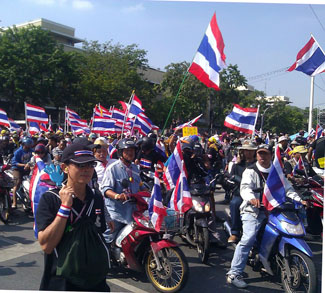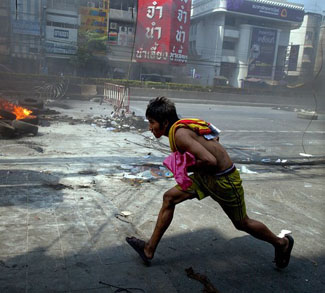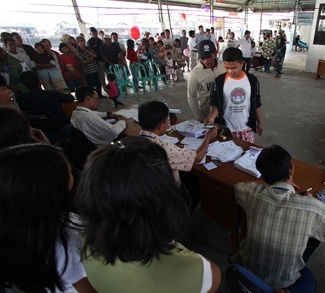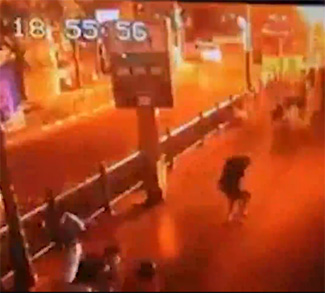Thailand is rarely far from the headlines. Disruptions and protests have been common over the past six years, but understanding the seemingly interchangeable factions, let alone the underlying causes of unrest, can be confusing and difficult for outsiders. This article will explain the root causes of political instability in Thailand in order to provide a clearer picture of the country’s future.
Since the 2006 military coup, Thailand has suffered numerous political disputes, mostly relating to supporters of former prime minister Thaksin Shinawatra, the United Front for Democracy against Dictatorship (commonly known as the “red shirts”), the Pheu Thai Party, and supporters of the opposition People’s Alliance for Democracy and Democrat Party.
Regardless of who is in power, each party has been paralysed by the presence of large-scale protests decrying the illegitimacy of their rule – most recently in December, when Democrat Party MP Suthep Thaugsuban triggered the current crisis by demanding that Prime Minister Yingluck Shinawatra stand down and hand power over to an unelected “people’s council.”
To those not closely acquainted with Thai politics, the competing accusations of corruption and abuse of authority can quickly become confusing. A simple socioeconomic analysis isn’t enough to elucidate the situation: Thaksin may be one of Thailand’s self-made billionaires, but many who oppose him are themselves prominent landowners or longstanding members on the Thai political scene.
Instead, the current state of Thailand can only be fully appreciated by examining Thai history, particularly the historical roles of the monarchy and the military.
A Brief History of Political Turbulence
The military has been a strong presence in Thai politics since the (perhaps poorly named) Siamese Revolution of 1932. During this event, which can accurately be described as a coup d’état, the military and government bureaucracy oversaw the transition from absolute to constitutional monarchy. These changes mostly stemmed from the failure of the absolutist state to deal with the impact of the Great Depression, but they perhaps were also influenced by a significant cut in defense spending which threatened to weaken the power of the military in Thai society.
This started a period in which the military dominated Thai politics, though it was internally riven by factional strife between army and navy. This situation persisted well into the 1970s, with the military also benefitting from an anti-communist stance that meshed well with US regional priorities.
The 1970s brought significant unrest from peasants and farmers, an uprising in the northern plains, and pro-democracy protests that started with students in Bangkok before spreading to a number of important Thai constituencies, including the rapidly-emerging middle class. Peasant grievances were tied to absentee landlordism – a holdover from the absolutist monarchy – and rice prices, whereas urban protests were more about rising expectations among a newly educated population. The end result was an end to military government and the institution of civilian rule.
But the military did not completely fade from politics. Institutional weaknesses meant it could still exert a strong, if informal role, especially as the international situation became increasingly unstable. Equally, the student movement became radicalised, allowing the military to court right-wing parties and take a role in suppressing the worst excesses of the students by linking them with the communist insurgency in the countryside. The transition to civilian rule was not smooth, and it involved elements of military pushback, including two periods of military rule in 1976 and 1977, and an attempted coup by junior officers in 1981.
Thailand underwent another brief period of military rule between 1991 and 1992, possibly due to Prime Minister Chatchai initiating a series of policies designed to further reduce the role of the military in national politics.
The Military Factor
The Thai military’s long history of involving itself in politics persists to this day. Despite, or perhaps because of a policy of mandatory retirement, high ranking officers tend to enter into politics after military service, especially in monarchist-aligned right-wing parties. While this reduces their long-term influence in the armed forces, it does not eliminate it completely, and political factions often arise based on former and current service within particular regiments or segments of the military.
Thus the military plays both a strong formal and informal role in the workings of the Thai state, often intervening for a “corrective” action, and occasionally establishing direct military rule.
The Monarchy Factor
The second key factor in understanding the Thai political crisis is the monarchy, which exerts an even more diffuse and subtle influence than that wielded by the military. Despite being legally circumscribed by the legislative and executive branches, the institution of the monarchy commands wide respect in Thai society, and the apparent support of the crown can go a long way in bestowing legitimacy on a given politician or political movement.
The military has often sought to legitimize its active role in the Thai political process by claiming to act in the name of the monarchy, and the close relationship between the crown and the armed forces may partially account for the continuing strong role of the latter.
This role is further complicated by the existence of factional struggle within the Chakri Dynasty. Media censorship, including the foreign press, has attempted to suppress the existence of these divisions. The central point of contention revolves around the crown prince and heir apparent to the throne, Maha Vajiralongkorn, and his suitability, or lack thereof, to succeed King Bhumibol Adulyadej.
Rumours swirl around the private life of the prince, whose alleged misconduct suggests he is a playboy unsuitable for public life, with a love for gambling, womanizing, opulence and unusual proclamations, such as making his pet dog an officer in the Thai military. More importantly, the crown prince is alleged to have had strong financial links to Thaksin Shinawatra, who apparently helps fund his gambling addiction.
Succession laws allow for the possibility that Prince Vajiralongkorn will not be the next king. While the crown prince has traditionally been the designated heir to the throne, the 1924 Palace Law dictates that the ruling king may “designate any descendant of the royal family as heir to the throne.” Thus far this has not occurred, but given the crown prince’s lack of popularity, certain factions in the royal court and political elite are looking for the law to be used to prevent his ascension to the throne.
If the king himself does not designate an heir, then the Privy Council has the power to decide who shall be the successor. The current Privy Council is known to view the crown prince unfavourably, preferring his sister.
Therefore, the relationship between Prince Vajiralongkorn and former prime minister Thaksin Shinawatra might be viewed in a suspicious light given the benefits to both parties should they cooperate on the issue of succession.
Of course, Thaksin’s leadership was characterized by a host of problems. In addition to the issues of corruption and tax evasion, there were strong indications that Thaksin’s populist stance was starting to strain the Thai economy and that growth in the aftermath of the Asian financial crisis of 1997-98 was overly dependent on unsustainable foreign loans. Such policies won Thaksin the loyalty of Thailand’s neglected rural areas, which benefited greatly during his time in power, but he earned the animosity of the urbanised middle classes.
Going Forward
Unfortunately, this political legacy leaves Thailand in a precarious position. Many in the countryside feel that the reversal of Thaksin’s policies revealed an urban animus against their rural brethren. However, said policies cannot be continued without finding new sources of revenue, which ultimately means taxing a Thai middle class that feels it has already paid enough for Thaksin’s corruption.
In and of themselves, these divisions would not mean much, as they mirror rural/urban disputes in many parts of the world. However, with disputes surrounding the royal family and the political role of the army, they become much more dangerous. Furthermore, until the role of the army is circumscribed and the royal succession is determined, it is possible that any major cleavage in Thai public opinion could be leveraged into such a dispute, with highly disruptive consequences.




